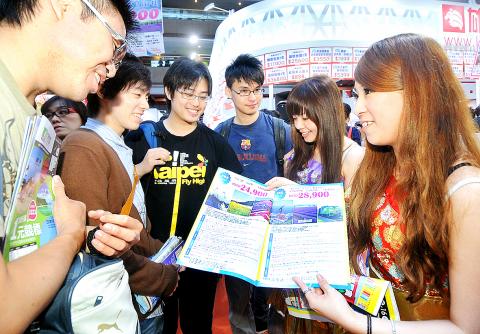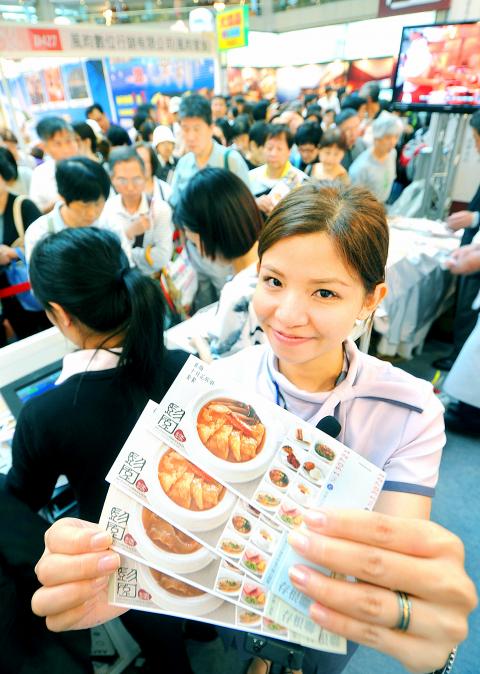The public has regained an interest in traveling to Japan after a massive earthquake and tsunami in March devastated Japanese tourism, travel agencies said yesterday.
On the first day of the Taipei Tourism Expo, one of the biggest travel fairs in the nation, travel agents found good momentum for tours of Japan thanks to promotional strategies that pitched more products at better prices.
Jun Mukai, sales representative at Japan Update Navigator Corp (向日遊顧問公司), said his company was addressing concerns about radioactive fallout from the crippled Fukushima Dai-ichi nuclear power plant by promoting trips to the countryside, away from the danger zone, such as the Tateyama Kurobe Alpine Route.

Photo: Fang Pin-chao, Taipei Times
“We’ve had a very positive response,” he said.
Hsu Kuang-fu, manager of Star Travel Corp (燦星旅遊), said he had sold 60 Tokyo travel packages in the first two hours of the expo.
He said the packages, each costing about NT$14,000 (US$492), are at a 30 percent discount to the regular-season price for tours of Japan.

Photo: Fang Pin-chao, Taipei Times
“As long as we start getting people back to Tokyo, we get people back to Japan,” he said.
Hsu also sees Japan’s tourism recovery as a good omen for Taiwan’s travel industry later this year.
“People are getting tired of the series of wars and natural disasters that have kept them from traveling,” Hsu said, highlighting North Korea’s bombardment of South Korea’s Yeonpyeong Island last November, snowstorms in Europe throughout the winter and the Japanese earthquake and tsunami.
“I’d say we are about to see a stop-loss point and soon we will see Taiwan’s travel industry thriving,” he said.
The four-day Taipei Tourism Expo began yesterday morning at the Taipei World Trade Center Exhibition Hall I with Premier Wu Den-yih (吳敦義) giving a speech at the opening ceremony.
Wu said Taiwan should increase its target for visitors to the nation to 7 million, compared with the original aim of 6.5 million, and that he hoped to see the number increase to 10 million in two or three years.

To many, Tatu City on the outskirts of Nairobi looks like a success. The first city entirely built by a private company to be operational in east Africa, with about 25,000 people living and working there, it accounts for about two-thirds of all foreign investment in Kenya. Its low-tax status has attracted more than 100 businesses including Heineken, coffee brand Dormans, and the biggest call-center and cold-chain transport firms in the region. However, to some local politicians, Tatu City has looked more like a target for extortion. A parade of governors have demanded land worth millions of dollars in exchange

An Indonesian animated movie is smashing regional box office records and could be set for wider success as it prepares to open beyond the Southeast Asian archipelago’s silver screens. Jumbo — a film based on the adventures of main character, Don, a large orphaned Indonesian boy facing bullying at school — last month became the highest-grossing Southeast Asian animated film, raking in more than US$8 million. Released at the end of March to coincide with the Eid holidays after the Islamic fasting month of Ramadan, the movie has hit 8 million ticket sales, the third-highest in Indonesian cinema history, Film

Taiwan Semiconductor Manufacturing Co’s (TSMC, 台積電) revenue jumped 48 percent last month, underscoring how electronics firms scrambled to acquire essential components before global tariffs took effect. The main chipmaker for Apple Inc and Nvidia Corp reported monthly sales of NT$349.6 billion (US$11.6 billion). That compares with the average analysts’ estimate for a 38 percent rise in second-quarter revenue. US President Donald Trump’s trade war is prompting economists to retool GDP forecasts worldwide, casting doubt over the outlook for everything from iPhone demand to computing and datacenter construction. However, TSMC — a barometer for global tech spending given its central role in the

Alchip Technologies Ltd (世芯), an application-specific integrated circuit (ASIC) designer specializing in server chips, expects revenue to decline this year due to sagging demand for 5-nanometer artificial intelligence (AI) chips from a North America-based major customer, a company executive said yesterday. That would be the first contraction in revenue for Alchip as it has been enjoying strong revenue growth over the past few years, benefiting from cloud-service providers’ moves to reduce dependence on Nvidia Corp’s expensive AI chips by building their own AI accelerator by outsourcing chip design. The 5-nanometer chip was supposed to be a new growth engine as the lifecycle